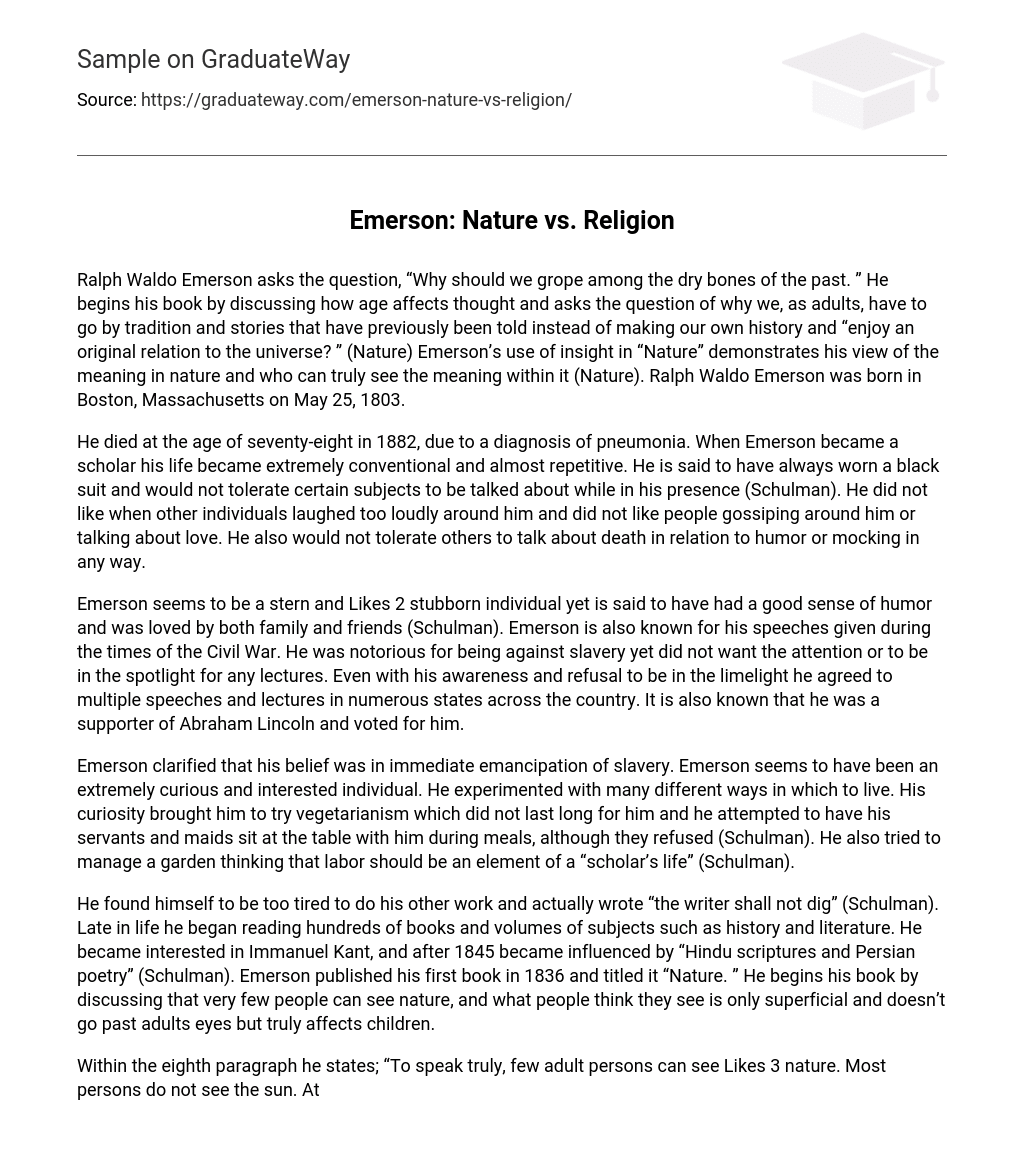Ralph Waldo Emerson asks the question, “Why should we grope among the dry bones of the past. ” He begins his book by discussing how age affects thought and asks the question of why we, as adults, have to go by tradition and stories that have previously been told instead of making our own history and “enjoy an original relation to the universe? ” (Nature) Emerson’s use of insight in “Nature” demonstrates his view of the meaning in nature and who can truly see the meaning within it (Nature). Ralph Waldo Emerson was born in Boston, Massachusetts on May 25, 1803.
He died at the age of seventy-eight in 1882, due to a diagnosis of pneumonia. When Emerson became a scholar his life became extremely conventional and almost repetitive. He is said to have always worn a black suit and would not tolerate certain subjects to be talked about while in his presence (Schulman). He did not like when other individuals laughed too loudly around him and did not like people gossiping around him or talking about love. He also would not tolerate others to talk about death in relation to humor or mocking in any way.
Emerson seems to be a stern and Likes 2 stubborn individual yet is said to have had a good sense of humor and was loved by both family and friends (Schulman). Emerson is also known for his speeches given during the times of the Civil War. He was notorious for being against slavery yet did not want the attention or to be in the spotlight for any lectures. Even with his awareness and refusal to be in the limelight he agreed to multiple speeches and lectures in numerous states across the country. It is also known that he was a supporter of Abraham Lincoln and voted for him.
Emerson clarified that his belief was in immediate emancipation of slavery. Emerson seems to have been an extremely curious and interested individual. He experimented with many different ways in which to live. His curiosity brought him to try vegetarianism which did not last long for him and he attempted to have his servants and maids sit at the table with him during meals, although they refused (Schulman). He also tried to manage a garden thinking that labor should be an element of a “scholar’s life” (Schulman).
He found himself to be too tired to do his other work and actually wrote “the writer shall not dig” (Schulman). Late in life he began reading hundreds of books and volumes of subjects such as history and literature. He became interested in Immanuel Kant, and after 1845 became influenced by “Hindu scriptures and Persian poetry” (Schulman). Emerson published his first book in 1836 and titled it “Nature. ” He begins his book by discussing that very few people can see nature, and what people think they see is only superficial and doesn’t go past adults eyes but truly affects children.
Within the eighth paragraph he states; “To speak truly, few adult persons can see Likes 3 nature. Most persons do not see the sun. At least they have a very superficial seeing. The sun illuminates only the eye of the man, but shines into the eye and the heart of the child” (Nature 8). Here he is discussing that children’s innocence and fresh introduction to the world shows that they see the true beauty in nature. Within the introduction Emerson states a metaphor that not only displays his philosophical thoughts but exhibits perfectly how he tries to describe the present way in which people live.
He states; “why should we … put the living generation into masquerade out of its faded wardrobe? ” (Nature 1) This quote could be interpreted in many ways depending on the reader, but he is comparing the present generation’s traditions to being put into an old mask that’s been sitting in a wardrobe for an extended amount of time. Essentially, society is wearing the same faded wardrobe that it always has and needs some originality. This statement he makes is one I concur and understand to be true.
Within “Chapter Five Discipline” Emerson states; “The first steps in Agriculture, Astronomy, Zoology, (those first steps which the farmer, the hunter, and the sailor take,) teach that nature’s dice are always loaded; that in her heaps and rubbish are concealed sure and useful results” (Nature 2). He explains that there are things within nature that are both useful and functional. This quote shows that he believes if you look closely within nature and understand the concept then underneath its “mask” there are beauties within nature useful to society and humans.
Emerson’s thoughts on life and nature are both significant and informative. He starts by first asking questions of “why” and displays his curiosity in the beginning of his book “Nature. ” Likes 4 As he continues in his work his thoughts seem to become less curious and more criticizing. Although within his work he appears angry and desires answers to the questions in which he asks his book is also extremely informative and causes the reader to think deeply about his thoughts.
The reader, because of Emerson’s reflection on his own thoughts, begins to also wonder why society is so traditional and initiates thoughts of our own originality. “Why should we grope among the dry bones of the past? ” Emerson wanted originality and a society with a mind of their own. Within his book “Nature” he discusses in a way that the mask should be lifted from everyone’s faces to see the true beauty in nature. Looking further into his novel and understanding his thoughts he shows that religion surrounds us and the beauty in nature itself, is God.





